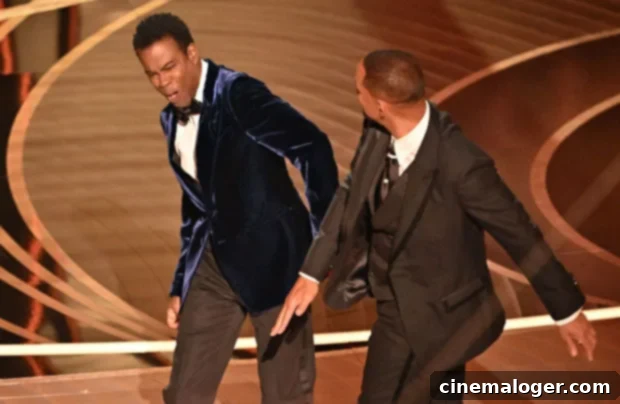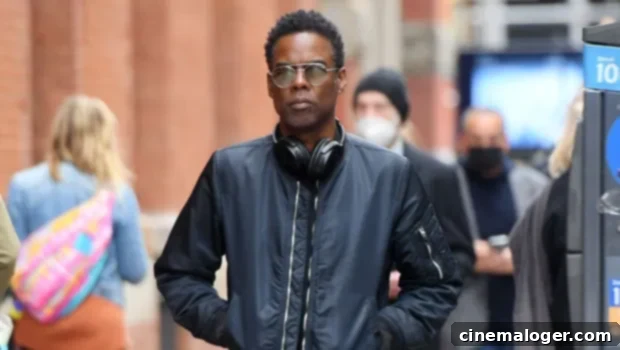Chris Rock’s Somber Stroll: Unpacking the Aftermath of the Oscars Slap and Kenny Rock’s Fiery Interview
In the days following the seismic event at the 2022 Academy Awards, where comedian Chris Rock, 57, was unexpectedly slapped on stage by actor Will Smith, 53, the public has been keenly observing the reactions and appearances of all involved. Rock himself was recently seen in New York City, cutting a noticeably somber figure during a morning stroll. The usually vibrant and energetic comedian appeared deep in thought, walking with his hands in his pockets and a serious expression etched across his face. Dressed in a black jacket, cargo pants, and colorful sneakers, with sunglasses shading his eyes and headphones draped around his neck, Rock’s demeanor suggested a man grappling with the immense global attention and personal impact of the incident. This quiet outing, just over a week after the shocking live television moment, offered a rare glimpse into his private processing of the widely discussed controversy.

During his Tuesday morning walk through the bustling streets of the Big Apple, Chris Rock maintained a solitary presence. He seemed largely oblivious to his surroundings, including any passing cameras or curious onlookers. His gaze remained fixed straight ahead, suggesting a profound internal focus, perhaps lost in contemplation over the events that have thrust him into an unprecedented spotlight. The contrast between his public persona as a witty, unshakeable comedian and this visibly pensive display was striking, underscoring the personal toll of the highly publicized altercation. While his exact destination remained unknown, his quiet departure from his usual animated self spoke volumes about the gravity of the situation and its lingering effects.
Kenny Rock Breaks Silence: A Brother’s Outcry and Demands for Justice
Chris Rock’s subdued public appearance came just one day after his brother, Kenny Rock, took center stage with a candid and highly critical interview regarding the incident. Speaking with the Los Angeles Times, Kenny articulated his profound concern for his older brother and expressed strong opinions on Will Smith’s actions and The Academy’s response. His interview quickly made headlines, adding another layer of family perspective to the already complex and emotionally charged narrative surrounding the Oscars slap. Kenny’s unwavering support for Chris was evident as he conveyed deep disappointment and anger, revealing the profound impact the event had not only on Chris but on their entire family.

The Demand for Oscar Revocation and Distrust of Will Smith’s Apology
Among Kenny Rock’s most forceful statements was his belief that the Academy Award for Best Actor, which Will Smith won shortly after the slapping incident, should be revoked. Kenny argued that Smith’s acceptance speech, delivered moments after assaulting Chris, lacked genuine remorse and instead appeared to justify his actions. “I might have looked at it differently had he initially apologized when he got on the stage and cried and accepted the award, but he didn’t, so, right there that tells me that it is something else,” Kenny explained. This delayed apology, which came days later via an Instagram post, was insufficient in Kenny’s eyes, fueling his suspicion that Smith’s initial display of emotion was not truly contrite. The sentiment resonated with many who questioned Smith’s immediate post-slap behavior, highlighting a significant divergence in public and familial expectations regarding accountability and sincerity.
Critiquing The Academy’s Inaction and Potential Dangers
Beyond his critique of Will Smith, Kenny Rock also held The Academy directly accountable for what he perceived as a severe lapse in judgment. He vehemently stated that Smith should have been immediately escorted out of the ceremony following the assault. “I hold them accountable for that. He could have went up there and did anything you wanted to my brother. It could have been much worse than what he did,” Kenny asserted, emphasizing the potential for greater harm. This perspective highlights a critical flaw in event security and protocol, suggesting that The Academy failed to protect its presenters and maintain decorum. Kenny’s fear was palpable, illustrating the perceived threat Chris faced on a global stage. He also minced no words in condemning Smith’s actions, stating, “In my opinion, he embarrassed himself by doing that and his legacy by doing that.” This sentiment underlines the profound reputational damage Smith incurred, not just for himself but also for the integrity of the prestigious awards ceremony itself.
Defending Chris Rock’s Joke and Jada Pinkett Smith’s Alopecia
A central point of contention in the entire controversy was Chris Rock’s joke about Jada Pinkett Smith’s shaved head, which was the direct catalyst for Will Smith’s violent reaction. Kenny Rock offered a crucial defense of his brother, suggesting that Chris was unaware of Jada’s medical condition, alopecia, which causes hair loss. “The joke was funny. It wasn’t hilarious funny, but I know that if he knew that she had alopecia … he wouldn’t make a joke about that. But he didn’t know,” Kenny clarified. This detail is pivotal, as it shifts the narrative from intentional cruelty to an accidental misstep, common in the fast-paced, improvisational nature of live comedy. Kenny’s statement aimed to dispel notions of malice on Chris’s part, framing the joke as an ill-timed remark rather than a deliberate jab at a sensitive health issue. This nuance has been central to discussions about comedic boundaries, empathy, and personal responsibility in the aftermath of the event.
The Slap Heard Around the World: A Brief Recap of the Oscars Incident
To fully grasp the magnitude of Kenny Rock’s statements and Chris Rock’s somber demeanor, it’s essential to revisit the shocking incident itself. On March 27, 2022, during the 94th Academy Awards ceremony, Chris Rock took the stage to present the award for Best Documentary Feature. In his usual quick-witted style, he delivered several jokes, including one directed at Jada Pinkett Smith, quipping, “Jada, I love ya. G.I. Jane 2, can’t wait to see it.” The joke referenced Pinkett Smith’s shaved head, comparing her to Demi Moore’s character in the 1997 film “G.I. Jane.” While Jada initially appeared to roll her eyes, her husband, Will Smith, unexpectedly walked onto the stage, approached Rock, and struck him across the face. The sound of the slap was clearly audible on the broadcast in some regions, leaving both the audience and viewers worldwide stunned.
Following the physical assault, Smith returned to his seat and, with visible anger, shouted twice at Rock, “Keep my wife’s name out of your f***ing mouth!” The immediate aftermath in the Dolby Theatre was a mixture of stunned silence and palpable tension. Chris Rock, remarkably composed, responded by saying, “Wow, dude. It was a G.I. Jane joke,” and continued with his presentation. The incident unfolded live on national television, quickly becoming the most talked-about moment of the night and dominating headlines globally for days, overshadowing all other Oscar winners and events. This unprecedented act of violence on one of Hollywood’s biggest nights sparked a widespread debate about celebrity behavior, comedic ethics, and the responsibility of public figures.
Will Smith’s Apology and Its Reception
Will Smith’s reaction to the slap was almost as controversial as the act itself. Just minutes after striking Chris Rock, Smith was back on stage accepting the Best Actor award for his role in “King Richard.” In an emotional acceptance speech, he apologized to The Academy and his fellow nominees, but notably, did not apologize to Chris Rock directly at that moment. Instead, he spoke about being a “fierce defender” of his family and expressed his desire to be a “vessel for love.” This omission drew heavy criticism and was a major point of contention for Kenny Rock and many others.
Two days later, Smith issued a formal apology via Instagram, explicitly addressing Chris Rock and acknowledging his behavior was “unacceptable and inexcusable.” He expressed remorse for his actions and recognized the impact he had on Rock, the Academy, and the millions of viewers. While some saw this as a necessary step towards reconciliation, many, including Kenny Rock, felt it was too little, too late. The delayed nature of the apology, coupled with the initial lack of direct contrition, led to skepticism about its sincerity. This public relations challenge compounded the already severe damage to Smith’s once-impeccable public image, igniting a broader conversation about celebrity accountability and the nuances of public repentance.
The Academy’s Response and Future Implications
The Academy of Motion Picture Arts and Sciences faced immense pressure to respond decisively to the incident. Initially, they issued a statement condemning violence and confirming a formal review of the situation. This review eventually led to a disciplinary process. Many critics, including Kenny Rock, argued that The Academy’s initial response was too slow and lacked immediate punitive action, especially regarding allowing Smith to remain in the venue and accept his award. The delay in escorting Smith out of the ceremony was a key point of contention, suggesting a prioritization of the show’s continuation over immediate action against misconduct.
Days after the slap, The Academy announced that it had initiated disciplinary proceedings against Will Smith for violations of its Standards of Conduct. Smith subsequently resigned from The Academy, preempting any potential expulsion. Despite his resignation, The Academy confirmed it would continue its disciplinary proceedings, ultimately banning Smith from attending the Oscars and any other Academy events for a period of ten years. This unprecedented decision underscored the severity with which the organization viewed Smith’s actions and aimed to send a clear message about unacceptable behavior within the film community. The incident sparked a wider debate about The Academy’s role in enforcing ethical conduct and maintaining the prestige of its awards.
Jada Pinkett Smith, Alopecia, and the Joke’s Context
Central to understanding the tension of the Oscars night is Jada Pinkett Smith’s struggle with alopecia. She has openly discussed her journey with the autoimmune condition that causes hair loss, sharing her experiences and vulnerability with her followers and on her talk show, “Red Table Talk.” Her decision to embrace a shaved head was a powerful statement of self-acceptance and defiance in the face of a challenging medical condition. Chris Rock’s joke, “Jada, I love ya. G.I. Jane 2, can’t wait to see it,” directly referenced this physical characteristic, albeit without public knowledge of its underlying medical cause.
Kenny Rock’s assertion that Chris was unaware of Jada’s alopecia adds a crucial layer to the discussion. While ignorance is not an excuse for insensitivity, it distinguishes the act from malicious intent. This situation ignited a robust debate about comedic boundaries, especially when it comes to sensitive personal or health-related topics. It also highlighted the public’s growing awareness and empathy towards medical conditions like alopecia, and the responsibility of public figures, including comedians, to be mindful of the potential impact of their words, even in a live, unscripted environment. The incident served as a stark reminder of the fine line between edgy humor and hurtful remarks, particularly when personal struggles are unknowingly involved.
Chris Rock’s Public Silence and Anticipated Return to Stage
In the immediate aftermath of the slap, Chris Rock maintained a notable public silence regarding the incident, beyond his calm on-stage reaction. He chose not to issue any formal statements or engage in public commentary, letting his brother Kenny speak on behalf of the family. This measured response from Chris himself has been widely observed and, for many, underscored his professionalism and composure under duress. However, his quiet public appearances, like the somber stroll in NYC, suggest an internal processing of the dramatic events rather than indifference.
Despite the controversy, Chris Rock’s comedy tour, which was already underway, saw a significant surge in ticket sales. Audiences are eagerly anticipating his eventual public address of the incident during his stand-up performances. Known for his keen observational humor and ability to tackle sensitive topics with wit, there is widespread expectation that Rock will integrate the slap into his comedy routine. The stage, for Chris Rock, is likely to be his chosen platform to fully articulate his thoughts and feelings, allowing him to process the event through his art and connect with his audience on his own terms. His eventual commentary is expected to be a major cultural moment, further shaping the public’s understanding of the incident and its aftermath.
The Broader Impact: Hollywood, Mental Health, and Public Discourse
The Will Smith-Chris Rock altercation transcended a mere celebrity spat; it became a global cultural flashpoint. The incident ignited widespread discussions across social media, news outlets, and academic circles about a multitude of issues: the appropriate response to disrespect, the boundaries of comedic expression, mental health in the entertainment industry, toxic masculinity, and the responsibility of public figures. Celebrities, commentators, and the general public weighed in, often with strong and divided opinions, reflecting the complex layers of the event. It forced a critical examination of Hollywood’s internal dynamics, its standards of conduct, and its role as a moral compass in society.
Beyond the immediate shock, the slap raised serious questions about the mental and emotional pressures faced by individuals in the public eye. It brought into focus the personal struggles that often unfold behind the glamorous facade of fame. The heated debates highlighted the different interpretations of respect, offense, and retaliation, revealing deep societal divisions. The incident served as a potent reminder of how quickly a moment of live television can escalate into a global phenomenon, triggering complex conversations about ethics, empathy, and accountability in an increasingly connected world.
Will Smith’s Road Ahead
For Will Smith, the aftermath of the Oscars slap has presented an unprecedented challenge to his illustrious career and carefully cultivated public image. Once regarded as one of Hollywood’s most beloved and bankable stars, he now faces a significant period of introspection and potential professional fallout. His resignation from The Academy and the subsequent ten-year ban from its events are strong indicators of the gravity of his actions. Several projects he was attached to reportedly faced delays or reevaluation, signaling a tangible impact on his career trajectory. The public’s perception of Smith has undoubtedly shifted, moving from adoration to a complex mix of sympathy, condemnation, and disappointment.
The path forward for Will Smith will involve a considerable effort to rebuild trust and redefine his public persona. His apologies, while issued, have been met with varying degrees of acceptance. Moving beyond the immediate scandal will require sustained demonstrations of remorse, personal growth, and perhaps a period of withdrawal from the intense public spotlight. The challenge for Smith is not merely about career rehabilitation but about mending relationships and confronting the profound ethical questions his actions raised. His journey back, if successful, will be a testament to resilience and the capacity for redemption within the unforgiving world of celebrity.
Conclusion: An Unfolding Narrative
The Oscars slap continues to reverberate through Hollywood and beyond, leaving a lasting imprint on all involved. Chris Rock’s somber walk in New York and his brother Kenny’s impassioned interview underscore the deeply personal and emotional toll of the incident. While Will Smith has faced significant consequences and issued apologies, the wound remains fresh, particularly for the Rock family. The Academy’s disciplinary actions, the public discourse around comedic boundaries, and the heightened awareness of conditions like alopecia have all been shaped by that one shocking night.
As the dust slowly settles, the true legacy of the Oscars slap remains an unfolding narrative. It has forced a reevaluation of conduct in public spaces, the nature of celebrity apologies, and the responsibilities that come with immense fame. The world waits to hear Chris Rock’s full comedic response, while Will Smith embarks on a long road to potential redemption. The incident will undoubtedly serve as a cautionary tale and a significant moment in the cultural history of the 21st century, reminding everyone of the unexpected power of live television and the profound impact of individual actions.
